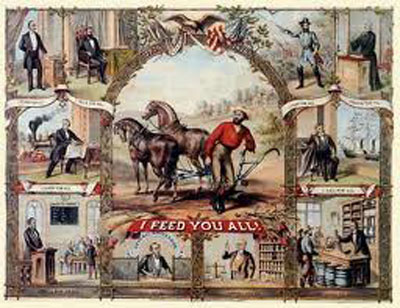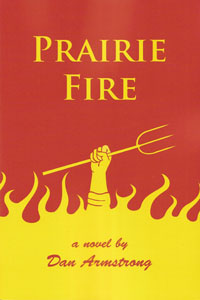

By Lanny Cotler, Little Lake Grange #670 (Willets, CA.)
I give nothing away (no spoilers) when I tell you that a heroic protagonist in Dan Armstrong's thriller novel, PRAIRIE FIRE…is the Master of the National Grange!
His name is Forest Mahan and he is the spark plug, the inspiration and fount of wisdom and democratic courage that drives the taut, gripping, exceedingly relevant story.
What happens when enough grain farmers across America, especially the Midwest, decide that the convoluted structure of the economic system between the small, independent family farmer and the end-user is unfair? Or worse. That's the beginning of PRAIRIE FIRE, and while it takes you back to the thrilling days of yester-year –when farmers all across America rose up and formed, out of necessity, the National Grange of the Order of the Patrons of Husbandry! –it also pulls you hard into the crisis felt by small and medium-sized farmers today.

The genius of Armstrong's storytelling is in his ability to create and clearly define the protectors of our common ground. You think you know who the good guys and bad guys are in real life? Armstrong has some surprises for you. From the small wheat farmer in Nebraska and Kansas -- to the inner sancta of Homeland Security –the threads to this thriller knit and pull at page-turning speed.
The second paragraph of the Prologue to Prairie Fire reads thus: "The farmers were frustrated for a whole lot of reasons, from subsidy politics to the skyrocketing price of petroleum products to recent fluctuations in the grain market. Fluctuations, hell, out and out manipulation is what a lot of folks were calling it! One way or the other, all agreed. Things had been pinching in pretty hard on the small guy of late. The cost of farming, human and financial, didn't quite seem worth it anymore."
Here are the main characters, in order of appearance:
Nathaniel Cromwell: Retired colonel, U.S. Special Forces, and though the recipient of a Medal of Honor, left the military precipitously when he discovered the CIA dealing drugs. He returns to his family's grain farm in Kansas, and there he's happy to stay…until he meets the National Grange Master and later the leader of Americas militias. Uncommon associates? Indeed. But Armstrong is looking for common ground.
Forest Mahan: President of the National Grange (Master). He has studied the history of America's farmers, the plight of the farmers today, and the effects of industrial agriculture and transnational finance on the small farmer. He's a man on fire.
Linda Bennett: Syndicated columnist for The New York Financial Times. Her father, recently deceased, worked high up in the CIA. She's honest and concerned: a fair witness.
Atossa Andreas-Nelson: Sole heiress to Canada's Andreas Grain, second-largest grain broker in the world. She appears early in the story at her mansion with three guests: her brother, president of America Bank and chairman of the board of Merit Oil; the Secretary of Defense; and a man named McClay, one of the most powerful lawyers on Wall Street. Four big players–what could their purpose be?
James Kenaghy: President of the United States. Armstrong introduces us to the man behind the curtain. He seems so powerless in Washington that we continually wonder about his ability to deliver. Armstrong, however, shows us a real person with real and serious problems who decides to deliver on his promises.
General Vincent Hayes: Head of the Montana Militia (with links to all the states), agrees to provide Cromwell and Mahan with the sort of support his militia can uniquely give.
What keeps the pages turning? Armstrong can shift gears, story-threads, smoothly and definitively. Here's how he moves from the White House Oval Office to the grain fields of Kansas:
"While the masters of the universe were moving markers around on a board in Washington, out in America's heartland, three men in faded blue jeans, worn work shirts, and baseball caps had gathered at the one fence post all three of their farms shared, and in the laconic farmer way were discussing the most important thing on the face of the earth–topsoil. It was a slow Sunday afternoon, twelve days into April…. The winter growing season had been good, and the wheat was less than three months from harvest. There was reason to be satisfied, but the talk was subdued."
Those three men actually set the story's core in motion.
They know that heavy petro-chemical use is slowly but surely destroying their land. They talk about an alternative way of farming supposedly advocated by the National Grange President. It's amazing how Armstrong, a non-Granger, captures the essence of the populism, progressivism, and the democratic underpinnings to the founding of the Grange Movement 140+ years ago
I couldn't help it. I called Dan Armstrong on the phone, so fascinated was I with his treatment of the Grange and its deepest roots and mission:
LC: Are you a member of the Grange?
DA: No, never a member.
LC: Have you considered becoming a member?
DA: Yes, I'd consider it. Much of what I do here in the Willamette Valley as a farmer advocate could be the work of the Grange.
LC: Why did you use the Grange so centrally in your story?
DA: It was a natural fit. It was an organization already in place that just needed a dynamic leader. Once I read about the origin of the Grange, and Orville Kelley, I was hooked. I realized that what he was trying to do then still makes sense today. Farmers need an organized community and they have to work together. Cooperative is not a dirty word.
LC: Why did you put Forest Mahan in the middle of the story?
DA: Because I knew unity was the biggest hurdle for the farmers to overcome. I wanted a character that could get his arms around everyone. He's the perfect balance between the farmer and the environmentalist—the man who could sit at the table with both organic and conventional farmers and find the common ground.
LC: What do you want people to learn through this story?
DA: The two G's—grain and gasoline. Management of the planet starts with learning how to feed ourselves sustainably. Using petroleum inputs can't last.
LC: Do you think the small farmer or the market should determine what is grown and where?
DA: Neither. The land should dictate what we grow on it, not the market. And if the farmers are good stewards, they'll listen to the land.
So you see Mr. Armstrong writes about a world we know all too well. The book is neither left nor right: it's about localizing the stewardship of the land and the commitment that may be necessary in order to do so.
That's it. Get the book. Pass it around to all Grangers. Be a damn good thing to chat about the next time we all get together.
OTHER REVIEWS OF PRAIRIE FIRE:
North American Colleges and Teachers of Agriculture; Prairie Fire Newspaper, Lincoln, Nebraska; Frank Kaminski; California Grange Newsletter; Kit Bradley; Oness Press.

AVAILABLE NOW from Mud City Press for $20.00 plus shipping or purchase from Amazon.com or buy as a Kindle application for $3.99.
Also available in Eugene at BLACK SUN BOOKS, 2467 Hilyard and THE KIVA, 125 West 11th.